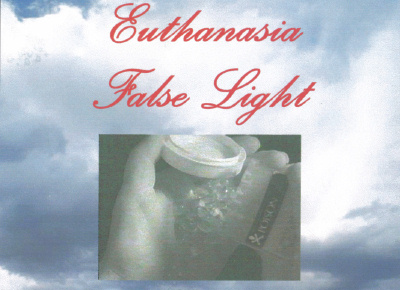Scroll down for articles
“Being disabled does not mean death is better than life”
(Delaware online January 28, 2022)
Delaware’s assisted suicide bill is based on legislation in Oregon, where assisted suicide was first legalized. Data from Oregon provides insight into the top reasons that patients ask for assisted suicide. The top five reasons which people gave were:
the loss of autonomy
being unable to participate in activities that make enjoyable
loss of dignity
loss of bodily functions
becoming a burden on family, friends, and caregivers
These reasons are all disability related. Pain, contrary to popular belief, does not even make it into the top reasons which people give to justify their application for assisted suicide….
Legalized assisted suicide sends the wrong message to the disability community: they are better off dead than disabled.
More on Disability Perspective
2021-2022
HB 140, titled “The Ron Silverio/Heather Block End of Life Options Law” was again introduced on June 30, 2021, the last day of the legislative session. It has been carried over for legislative action which began in January 2022.
Text of bill
2019-2020
HB 140, titled the “Ron Silverio/Heather Block End of Life Options Law,” is the latest attempt to legalize doctor-prescribed suicide in Delaware. It was introduced on May 2, 2019 and carried over to 2020. It did not pass in 2020
Text of bill
Analysis of bill
“Vote down HB 140. Let’s focus on aid in living, not aid in dying”
(Delaware online — March 13, 2020)
“Able-bodied people cannot tolerate the prospect of becoming a person with a disability and developing dependencies on another person. They are so appalled at the loss of ‘dignity’ this dependency brings that suicide is preferable to disability….Assisted suicide for this rationale supports the doctrine of better dead than disabled.”
More on Disability Perspective
2017 – 2018
“Assisted suicide bill removed from agenda again”
(Delaware State News — April 26, 2018)
The House of Representatives did not vote on a controversial assisted suicide bill Thursday, the second time in three months the measure has been yanked from the agenda….
Gov. John Carney opposes the bill, according to a spokesman.
“Delaware Push for Intellectually Disabled Assisted Suicide”
(National Review — January 22, 2018)
The proposed Delaware law has been amended so that terminally ill disabled people with significant intellectual impairments would be eligible for assisted suicide.
Text of amendment to HB 160.
2017 – 2018
A doctor-prescribed suicide bill (HB 160) was introduced by Rep. Paul Baumbach on May 2, 2017. The bill did not pass in the 2017 session but carried over to the 2018 session where it also failed to pass. The Delaware Medical Society opposed HB 160.
Text of bill
Analysis of bill
Track bill
Delaware Medical Society maintains opposition to doctor-prescribed suicide
Attempts to change the Medical Society’s position from oppose to neutral failed at its latest meeting.
According to Dr. Prayus Tailor, President of the Medical Society, “We really feel that the way that we should be empowering our patients at the end of life is to provide the best care that we can to palliate and alleviate pain and suffering. We feel physician assisted suicide is fundamentally inconsistent with our role as physicians and healers.”
From “Summary: The Medical Society of Delaware’s 228th meeting” (November 19, 2017)
2016
A draft doctor-prescribed suicide bill to permit “Medical Aid in Dying” was circulated by Rep. Baumbach but not introduced. The 2016 bill had many similarities to Baumbach’s 2015 (HB 150) bill but also contained significant differences.
Delaware 2016 “Medical Aid in Dying” Draft Bill Analysis
(Primary sponsors: Rep. Baumbach & Sen. Henry, Rep. B. Short and Sen. Sokola)
This 2016 draft, which was not introduced, contained many similarities to Rep. Baumbach’s 2015 failed “Death with Dignity” bill (HB 150). Like HB 150, it would have permitted doctor-prescribed suicide.
Unlike the earlier bill, under the draft bill:
There was no requirement that the diagnosis of a terminal illness be confirmed by a second physician.
A prediction of a six month life expectancy would not have been subject to review by a consulting physician.
There was no requirement that a severely depressed or mentally ill patient whose condition may be causing impaired judgment be referred for counseling.
The decision about the patient’s ability to make a request would have been subject only to a hospice program’s inter-disciplinary group evaluation. [Sec. 2506B and Sec. 2511B (d)]
The patient would not have been required to make as many requests as in theprevious bill.
A second oral request would not have been required. [Sec. 2508B and Sec. 2510B]
Hospices would have been involved in all doctor-prescribed suicide deaths.
- To be eligible for doctor-prescribed suicide, a patient would have been required to be enrolled in a hospice program. [Sec. 2501B (9)]
- A hospice group would have determined if the patient was capable of understanding his or her request for doctor-prescribed suicide. [2511B (d)]
- The lethal overdose would be provided only to the doctor or the hospice program. [Sec. 2504B (a) (8)b 2]
- The hospice program would have delivered the drugs to the patient. [Sec. 2506B (c)]
2015
A doctor-prescribed suicide bill, the “Death with Dignity” Act, was introduced, but later tabled.
Analysis of HB 150
Current law regarding assisted suicide
A person is guilty of promoting suicide when the person intentionally causes or aids another person to attempt suicide, or when the person intentionally aids another person to commit suicide.
Del. Code § 645
Articles
“Delaware Push for Intellectually Disabled Assisted Suicide”
(National Review — January 22, 2018)
The proposed Delaware law has been amended so that terminally ill disabled people with significant intellectual impairments would be eligible for assisted suicide.
“Assisted suicide bill sent to House floor”
(Delaware State News — June 7, 2017)
The Medical Society of Delaware opposes the bill, and one member of the group said Wednesday he fears physician-aided suicide could lead to less focus on treatment and cures.
“Delaware state Rep. Baumbach introduces bill to grant the terminally ill access to suicide medication”
(WDEL — May 2, 2017)
The bill next heads to the House Health & Human Development Committee.
“Physician-assisted suicide tabled in Health committee”
(Delaware Online — June 3, 2015)
Rep. Paul Baumback, D-Newark, said he requested that lawmakers on the House Health & Human Development Committee keep the “Death with Dignity” legislation in committee. By tabling the bill, lawmakers on the committee can always bring it back for a vote until June 30, 2016.
“Physician-assisted suicide bill introduced”
(Delaware Public Media — May 28, 2015)
Rep. Paul Baumbach so far is the lone sponsor on a bill to legalize physician-assisted suicide in Delaware he introduced Thursday. It’s the first time we did this in Delaware, so we’re going to walk before we run, said Baumbach. “We need to introduce the bill and have the conversation and we’re going to be doing that.”




